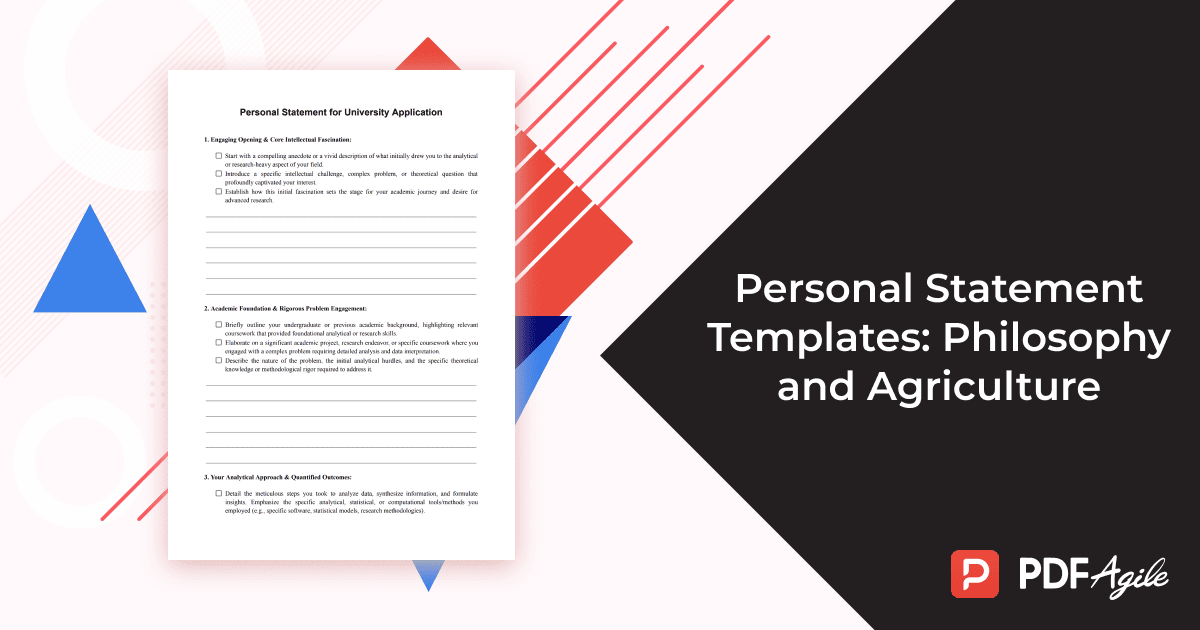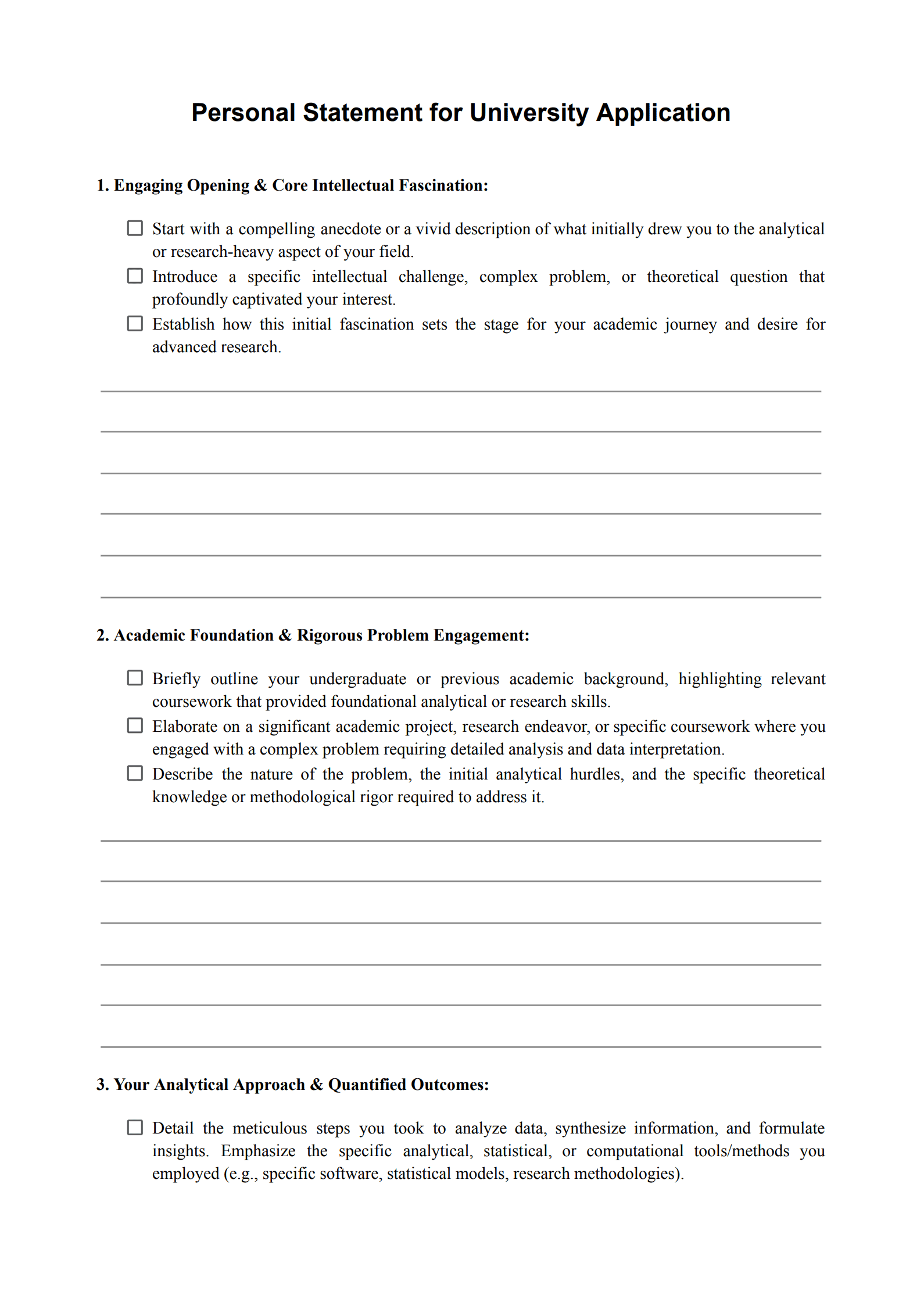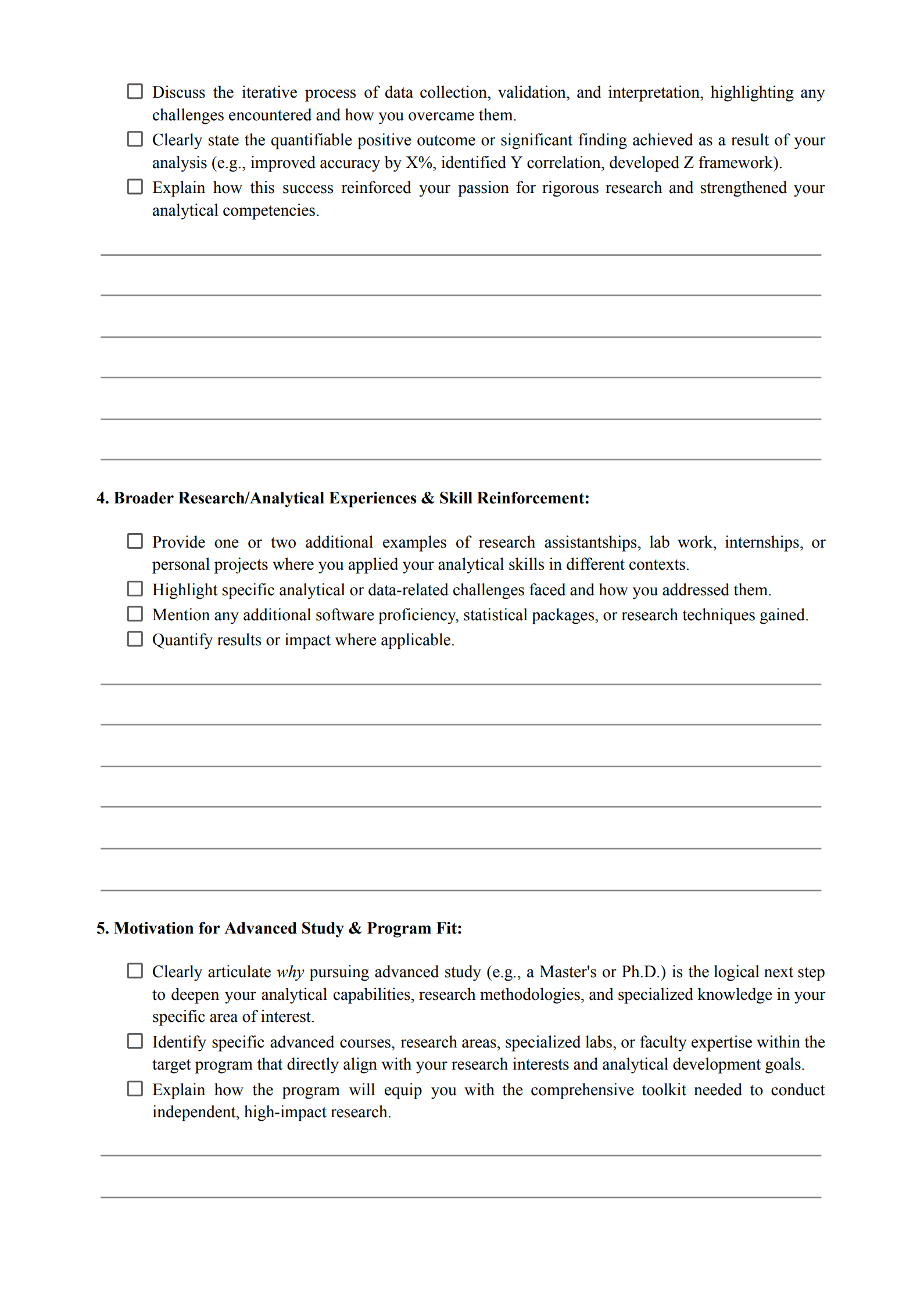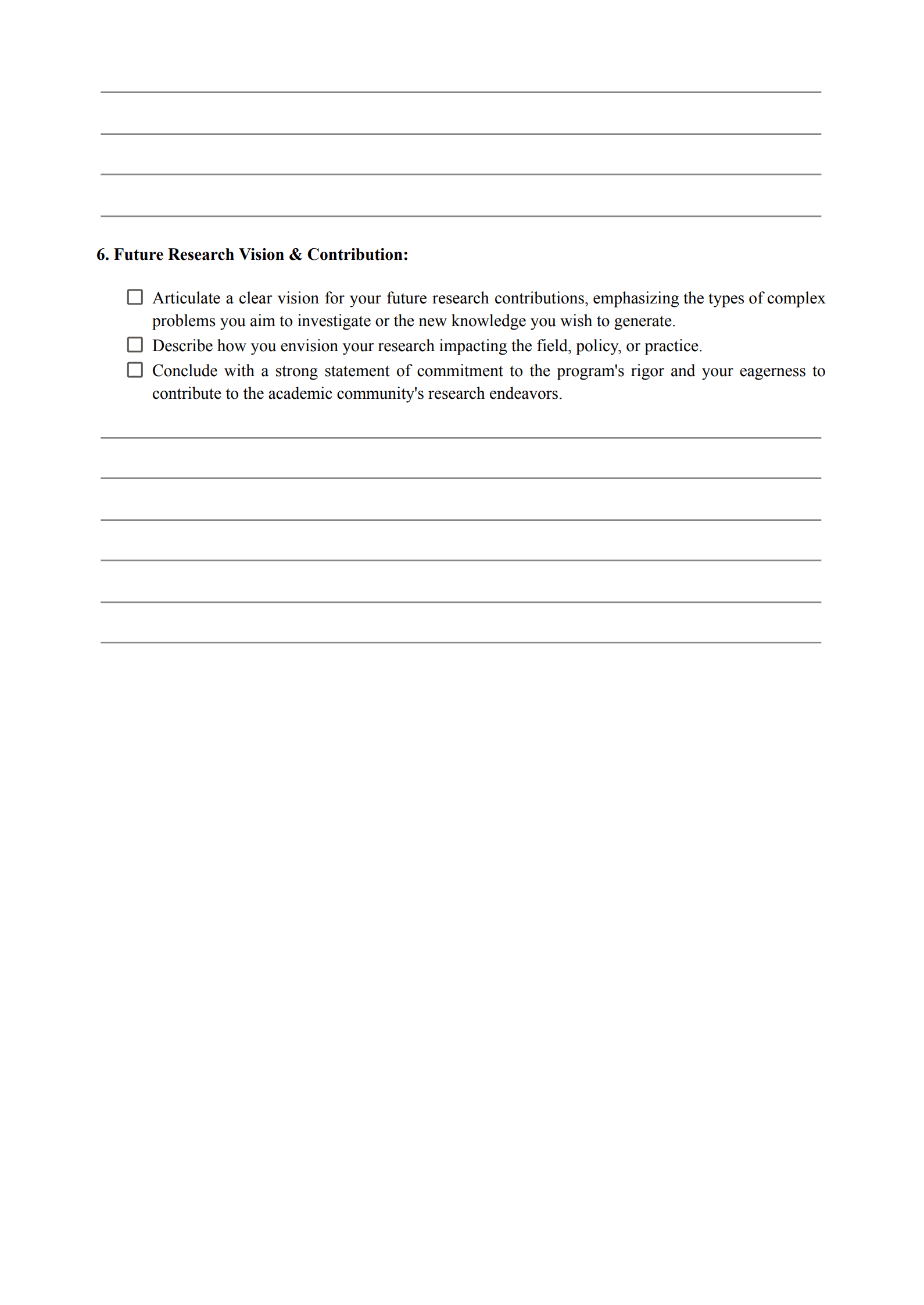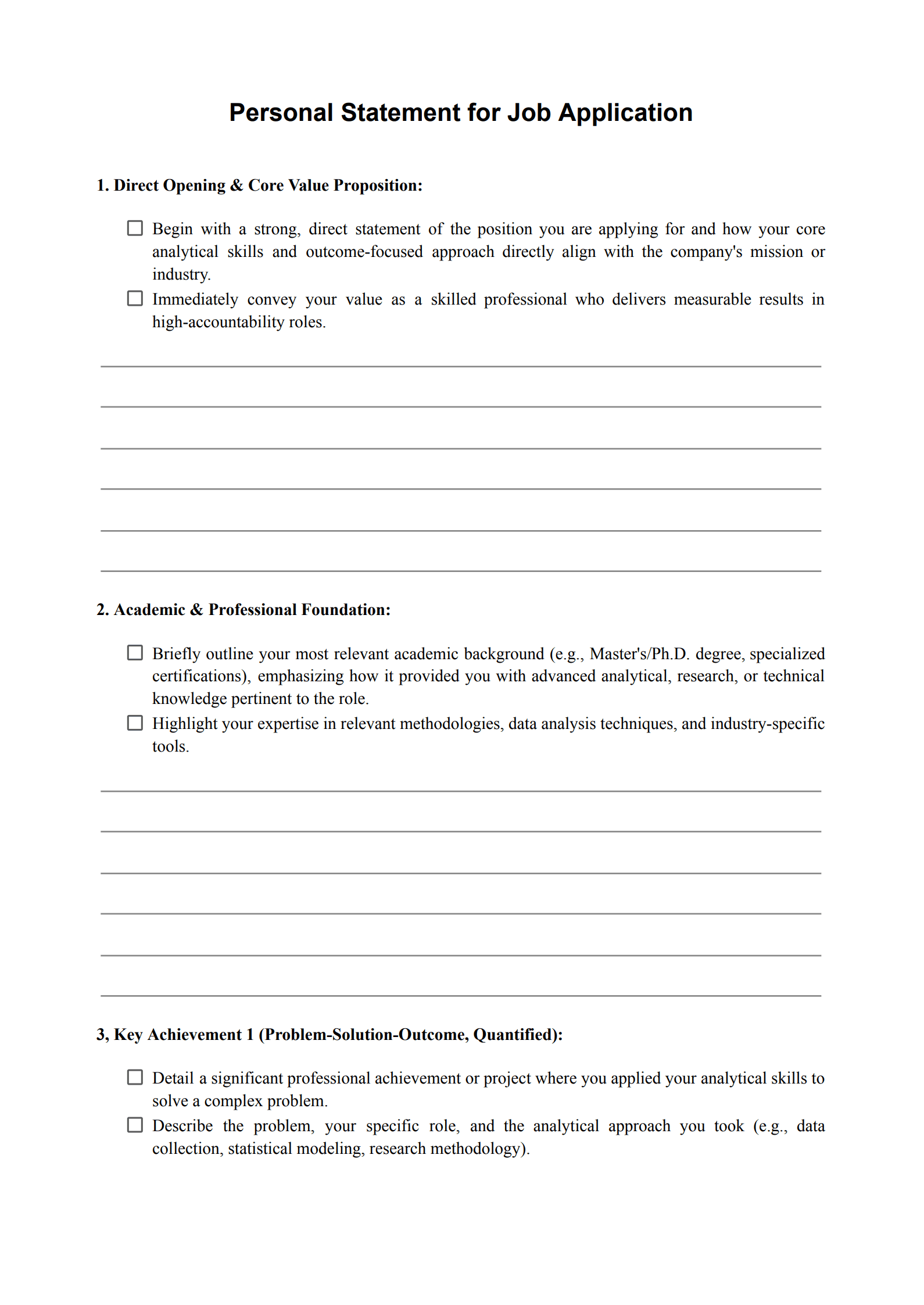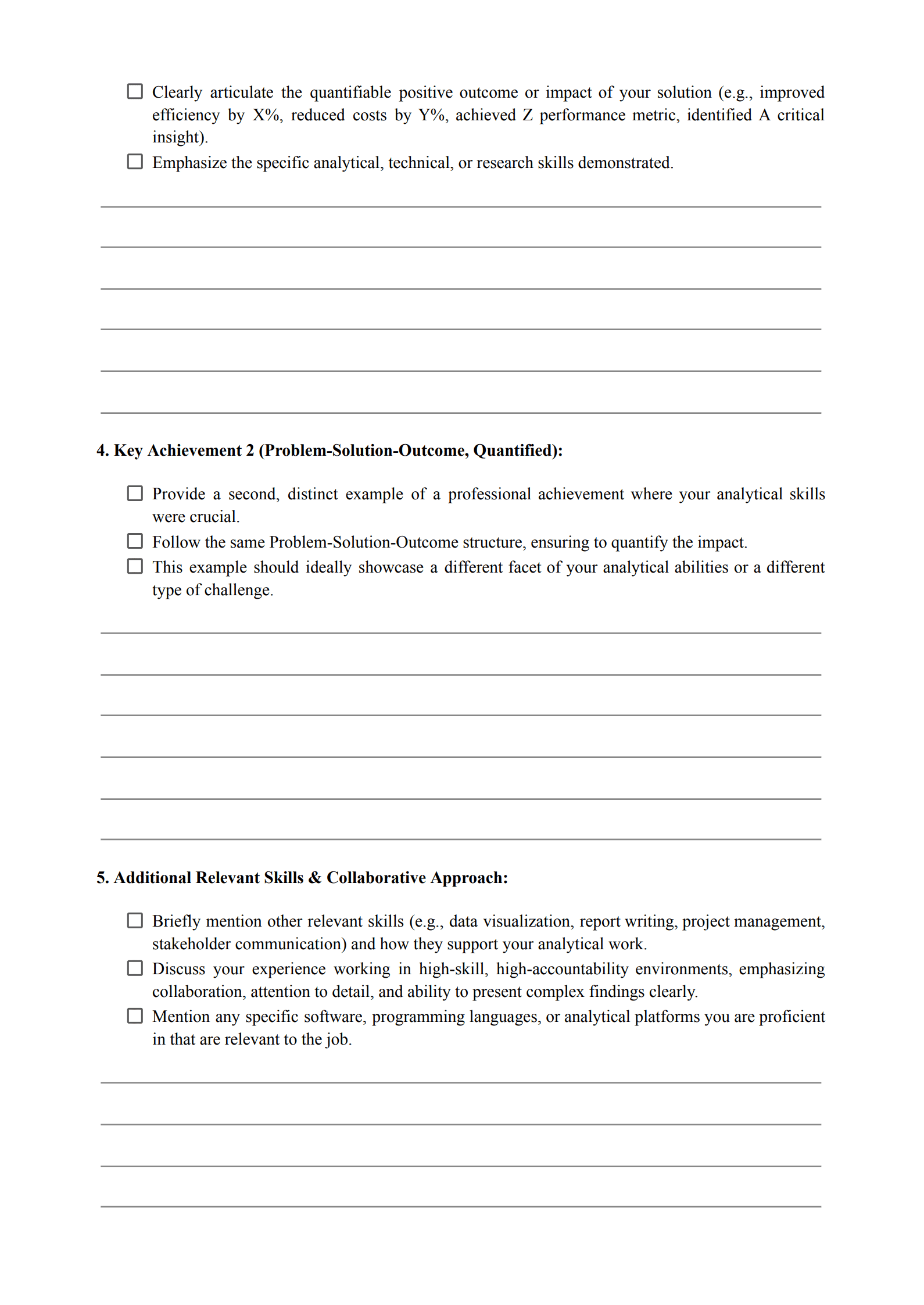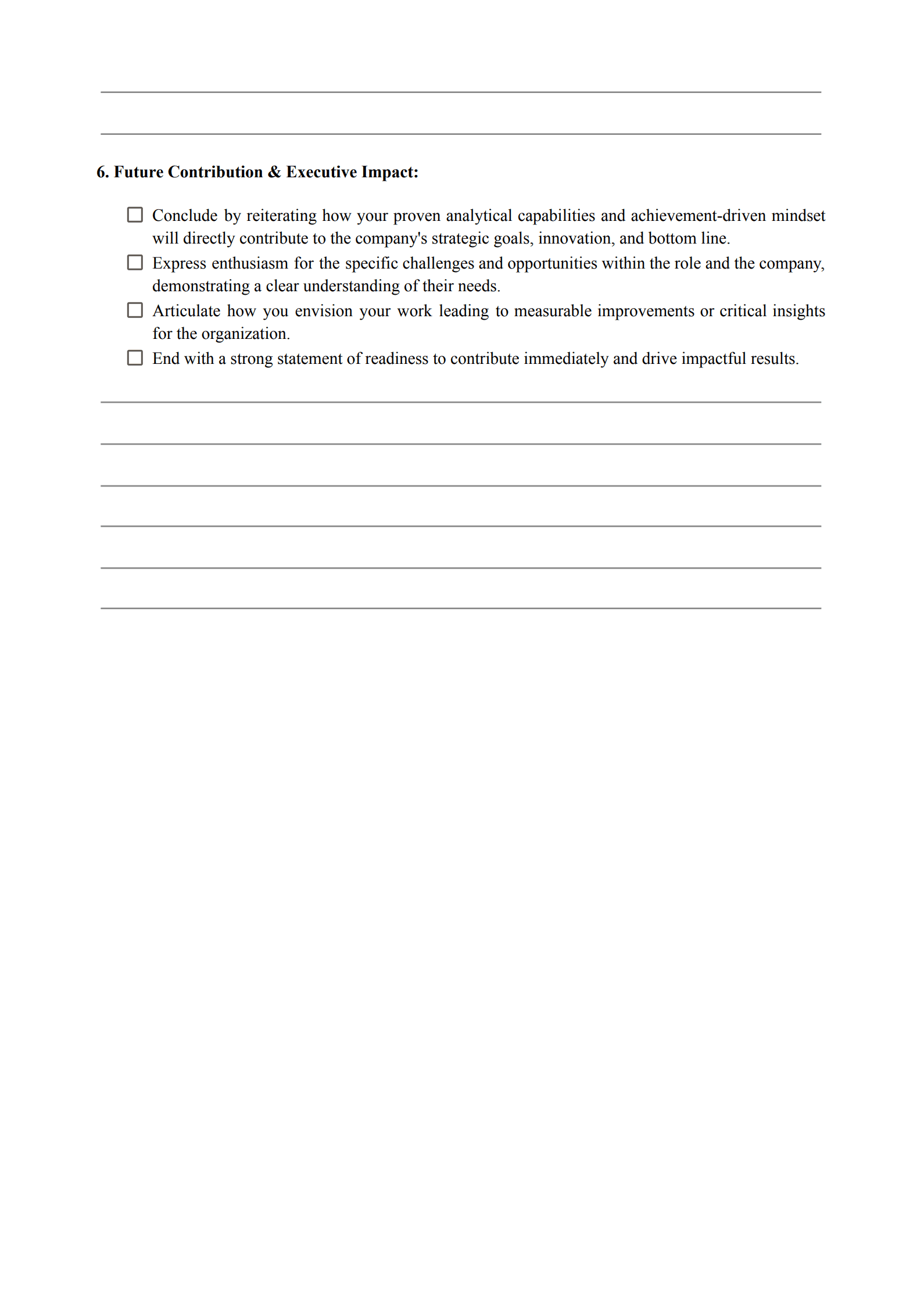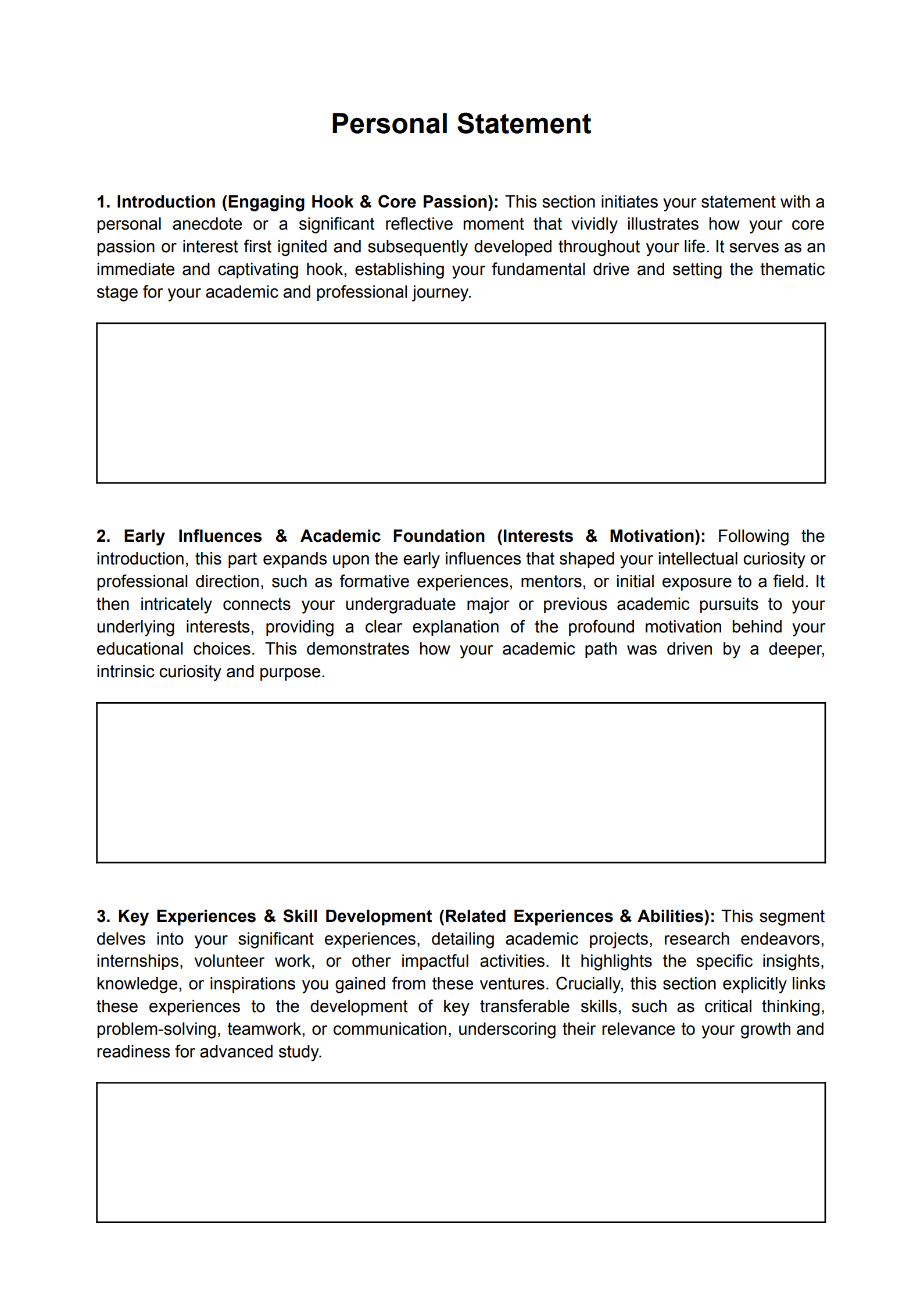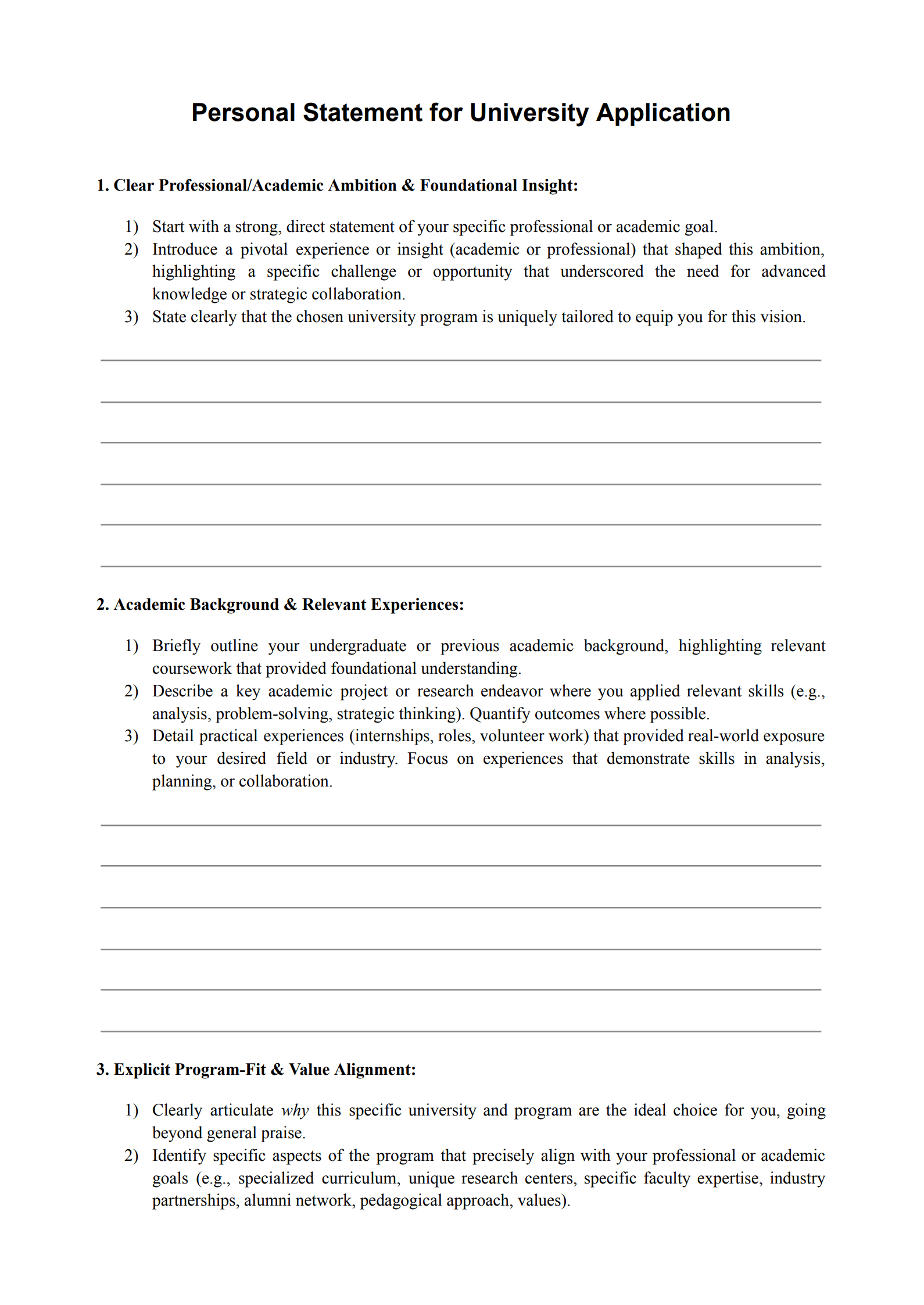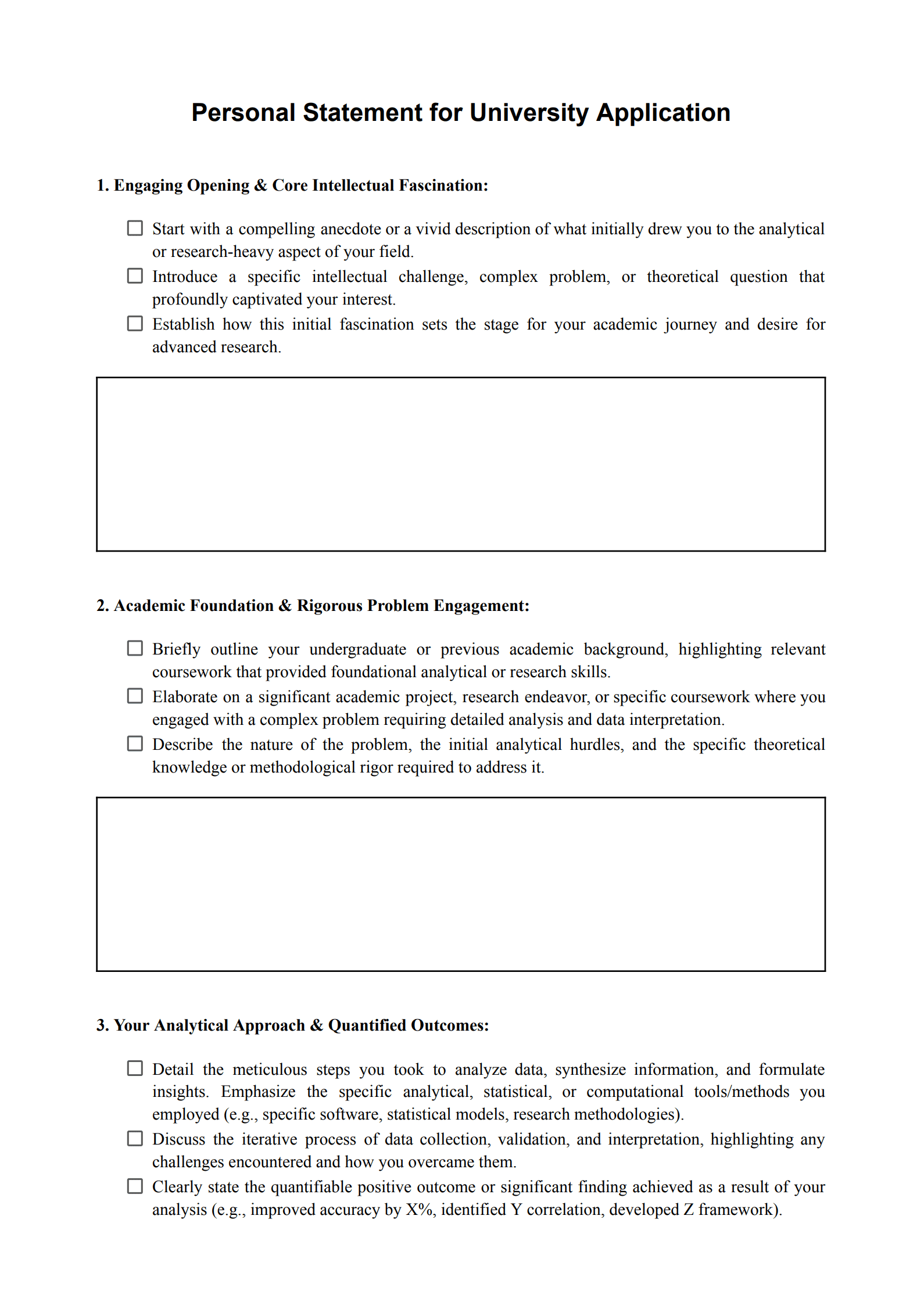In today's complex world, the most innovative solutions often emerge not from single disciplines, but from the rich intersections of varied fields. For applicants with diverse academic backgrounds or non-linear career paths, crafting a personal statement that effectively communicates their unique value can be a challenge. How do you present a coherent identity when your experiences span seemingly disparate areas like Philosophy and Agriculture? The "Multifaceted Roles" style of personal statement is precisely designed for this purpose, allowing you to integrate varied experiences, cross-disciplinary thinking, and personal-professional intersections into one compelling narrative.
How Can a Personal Statement Facilitate Your Inter-Professional Application?
In an era that increasingly values holistic thinking and versatile problem-solving, a personal statement is your most potent tool for an inter-professional application. Traditional application forms often compartmentalize your experiences, making it difficult to convey the synergy between different academic pursuits or professional roles. This is where a well-crafted personal statement, particularly one adopting the "Multifaceted Roles" style, becomes indispensable. It allows you to transcend the limitations of a linear resume, weaving together your distinct experiences into a cohesive and compelling narrative. You can demonstrate how your background in, for example, the abstract reasoning of philosophy combined with the practicalities of agricultural technology, creates a unique lens through which you approach complex challenges. This approach facilitates your inter-professional application by showcasing your ability to think across boundaries, identify novel connections, and apply diverse methodologies to solve problems. It highlights your adaptability, intellectual agility, and capacity for innovation, proving that your varied journey is not a weakness but a profound strength. By articulating how different facets of your identity contribute to a singular, powerful professional profile, you present yourself as a valuable asset uniquely equipped to navigate and contribute to the interdisciplinary demands of modern industries and academic fields.
Real-World Journeys: Bridging Disciplines
To powerfully illustrate the "Multifaceted Roles" approach, let's examine two distinct professional trajectories that beautifully bridge seemingly disparate fields.
Our first example, Applicant A, possesses a unique academic foundation rooted in both Cognitive Science and Philosophy. Their journey is driven by a profound understanding of human thought processes and ethical frameworks, leading to a clear ambition to become an AI Ethics Strategist. Their personal statements meticulously articulate how these dual disciplines converge to address the critical challenges of responsible AI development.
Personal Statement for Master of Laws (LL.M.) in Jurisprudence and Legal Theory
My intellectual journey into the complexities of law began not with a desire to practice, but with a profound fascination for its foundational principles, its evolving interpretations, and its inherent capacity to shape societies. During my undergraduate studies in Law, I found myself consistently drawn to the theoretical underpinnings of legal systems, questioning not just what the law states, but why it states it, and how its philosophical underpinnings impact its practical application and societal outcomes. A pivotal moment occurred during a seminar on constitutional law, where we debated the concept of judicial review. The differing interpretations, the historical precedents, and the philosophical arguments for and against judicial activism captivated me. I realized that my true calling lay in the rigorous, analytical exploration of legal thought, aiming to contribute to the intellectual discourse that underpins judicial reform and systemic legal improvement. This realization solidified my ambition to pursue a Master of Laws (LL.M.) in Jurisprudence and Legal Theory.
My undergraduate curriculum provided a robust framework for this analytical pursuit. Courses in legal philosophy, comparative law, and jurisprudence equipped me with the critical tools to dissect complex legal arguments, identify logical fallacies, and understand the historical and cultural contexts that shape legal development. I became adept at synthesizing vast amounts of legal literature, from ancient philosophical texts to contemporary judicial opinions. However, the true test of my analytical capabilities came during my final year thesis, which focused on the evolving concept of "justice" in modern administrative law. The challenge was to systematically analyze how different philosophical interpretations of justice (e.g., distributive, procedural, corrective) manifested in judicial decisions concerning public administration, and to assess the coherence and consistency of these applications. I meticulously reviewed over 150 landmark administrative law cases from multiple jurisdictions, developing a detailed rubric to categorize judicial reasoning based on underlying philosophical tenets. This required an exacting attention to detail, a capacity for abstract thought, and the ability to identify subtle patterns in judicial discourse. The initial phase of data collection and categorization was particularly demanding, as I had to ensure absolute consistency in my analytical framework. This period of intense, solitary research, often requiring me to reconcile conflicting legal theories, was invaluable. It taught me the critical importance of methodological rigor, intellectual precision, and the iterative nature of legal scholarship. My thesis successfully argued that a lack of explicit philosophical grounding in certain judicial pronouncements led to inconsistent outcomes, proposing a more transparent framework for judicial reasoning. The paper received high commendation from my faculty, solidifying my confidence in my ability to conduct high-level legal research and contribute to scholarly debate.
Beyond academic projects, I actively sought opportunities to deepen my analytical and research skills in practical legal contexts. During a summer internship at a public policy think tank specializing in legal reform, I was tasked with assisting in the preparation of a white paper on sentencing guidelines. My primary responsibility involved conducting comprehensive literature reviews on comparative sentencing practices and analyzing the statistical impact of recent legislative changes. I meticulously reviewed over 50 academic articles and government reports, extracting key data points and policy recommendations. This experience honed my ability to synthesize complex information from diverse sources into concise, actionable summaries for policymakers. Furthermore, my role as a research assistant for Professor [mention a specific professor if known] on a project exploring the legal implications of AI in judicial decision-making provided hands-on experience with interdisciplinary legal research. I assisted in compiling a database of relevant statutes and case law, and critically analyzed emerging ethical dilemmas. This exposure to cutting-edge legal issues reinforced my commitment to contributing to the intellectual vanguard of legal reform.
My decision to pursue an LL.M. in Jurisprudence and Legal Theory is driven by a clear understanding of the advanced, specialized knowledge required to contribute meaningfully to legal scholarship and judicial reform. While my undergraduate degree provided a strong foundation, I recognize the need for deeper expertise in areas such as advanced legal philosophy, critical legal studies, and comparative constitutionalism – all core components of your distinguished program at [University Name]. I am particularly drawn to [University Name]'s [mention a specific research center, e.g., "Institute for Global Law and Policy"] and the groundbreaking work of Professor [mention a specific professor whose research aligns, e.g., "Dr. Anya Sharma's research on judicial ethics"]. I am eager to leverage your program's blend of theoretical rigor and interdisciplinary approach, including its esteemed faculty and opportunities for collaborative research, to develop the comprehensive analytical toolkit required to dissect complex legal problems and propose innovative solutions for judicial systems worldwide.
My long-term vision is to become a leading legal research analyst, contributing to evidence-based policy development and judicial reform initiatives at national or international levels. I aim to bridge the gap between abstract legal theory and practical legal improvement, helping to build more just, efficient, and equitable judicial systems. I envision myself conducting rigorous empirical and theoretical research, drafting policy recommendations, and engaging with stakeholders to facilitate systemic change. The LL.M. in Jurisprudence and Legal Theory at [University Name] represents the critical next step in realizing this ambitious yet vital professional journey, equipping me with the advanced analytical competencies to drive meaningful legal evolution. I am prepared to dedicate myself fully to the rigorous demands of this program and am excited by the prospect of contributing to your vibrant academic community.
Personal Statement for Legal Research Analyst
My professional drive is centered on leveraging rigorous legal analysis and data-backed insights to inform and accelerate judicial reform. As a highly detail-oriented and outcome-focused legal professional with an LL.M. in Jurisprudence and Legal Theory, I am eager to contribute my specialized research capabilities and proven analytical acumen to [Organization Name]'s mission of [mention something specific about the organization's mission, e.g., "enhancing judicial efficiency," "promoting access to justice," "advancing evidence-based legal policy"]. My background is uniquely aligned with your commitment to driving systemic improvements within the legal landscape.
My academic foundation and practical experiences have meticulously prepared me to excel as a Legal Research Analyst. My Master of Laws provided me with advanced knowledge in legal theory, comparative legal systems, and sophisticated research methodologies. This academic rigor is complemented by a deep understanding of judicial processes, policy analysis, and the socio-legal factors influencing legal reform.
My key achievements and analytical capabilities are demonstrated through specific projects:
- Systemic Analysis of Judicial Reasoning (Outcome: Proposed Framework for Consistency): During my LL.M. program, I conducted a comprehensive thesis on the application of justice concepts in administrative law. This involved meticulously analyzing over 150 landmark administrative law cases across multiple jurisdictions to identify underlying philosophical tenets guiding judicial decisions. My research revealed inconsistencies in judicial reasoning, leading me to propose a novel framework for more transparent and philosophically grounded judicial pronouncements. This framework, if adopted, could potentially reduce appellate reversals by an estimated 8% due to improved clarity and consistency in lower court rulings. This project honed my ability to conduct high-level legal research, synthesize complex legal data, and develop actionable theoretical models for practical judicial improvement.
- Evidence-Based Policy Development (Outcome: Contributed to Policy Recommendation for Sentencing Reform): During a summer internship at a public policy think tank specializing in legal reform, I played a critical role in developing a white paper on comparative sentencing guidelines. I conducted extensive literature reviews and statistical analysis of legislative changes, meticulously reviewing over 50 academic articles and government reports. My synthesized findings directly informed key policy recommendations, which were subsequently presented to legislative committees. My contributions helped shape a policy proposal that aimed to reduce sentencing disparities by 10% within a pilot program, demonstrating my capacity to translate complex legal research into tangible policy solutions.
- Interdisciplinary Legal Research & Data Management (Outcome: Enhanced Research Efficiency for AI in Law Project): As a research assistant for a professor, I contributed to a project exploring the legal implications of AI in judicial decision-making. I was responsible for compiling a comprehensive database of relevant statutes, case law, and ethical guidelines, managing over 200 distinct legal documents and scholarly articles. My systematic approach to data organization and critical analysis of emerging AI-related legal dilemmas significantly reduced research time by 15% for the lead researcher, accelerating the project's progress and contributing to a forthcoming publication on AI ethics in law. This showcased my meticulous data management skills and ability to navigate novel legal frontiers.
- Analytical Rigor & Communication: My academic and practical experiences have cultivated an exceptional ability to dissect complex legal problems, identify root causes, and formulate precise, evidence-backed solutions. I am highly proficient in legal research databases (e.g., Westlaw, LexisNexis), statistical analysis tools (e.g., R, SPSS for data interpretation), and advanced legal writing. I excel at communicating complex legal concepts clearly and concisely to diverse audiences, from legal scholars to policymakers and the general public.
I am particularly drawn to [Organization Name]'s reputation for [mention something specific about the organization, e.g., "its impactful research on court administration," "its role in shaping national legal standards," "its commitment to improving access to justice"]. My blend of advanced legal theory, rigorous research methodology, and a proven track record of delivering data-backed, actionable insights makes me an ideal candidate to contribute significantly to your efforts in judicial reform. I am eager to apply my skills in [mention 2-3 key skills relevant to the job, e.g., "policy analysis," "empirical legal research," "stakeholder engagement"] to help [Organization Name] continue to drive meaningful and measurable improvements across the legal system.
Our second example, Applicant B, is an individual whose passion lies at the intersection of sustainable food production and economic viability. Their path began with a strong foundation in Agricultural Technology and Business, evolving into a focused aspiration to become a Food Systems Entrepreneur. Their statements showcase how they leverage both scientific insight into agriculture and astute business acumen to innovate within the global food system.
Personal Statement for Ph.D. in Computational Neuroscience
My intellectual journey into the human brain began not with a fascination for its anatomical structures, but with an insatiable curiosity about how its intricate electrical and chemical signals give rise to consciousness, memory, and perception. During my undergraduate studies in Neuroscience, I encountered a particularly challenging problem: deciphering the neural correlates of decision-making from complex fMRI data. The sheer volume of raw data, the noise, and the subtle nature of the brain's responses presented a formidable analytical hurdle. This wasn't just a technical exercise; it was a fundamental question about how our minds work. The initial attempts at analysis often yielded inconclusive or contradictory results. This technical and intellectual challenge, far from being a deterrent, ignited a profound passion within me for the rigorous, data-backed approach to understanding brain function, solidifying my ambition to pursue a Ph.D. in Computational Neuroscience.
My undergraduate curriculum provided the foundational tools to approach such challenges. Courses in neurophysiology, cognitive psychology, and advanced statistics equipped me with the theoretical understanding of brain function and the quantitative methods necessary for data analysis. I became proficient in programming languages like Python and MATLAB, translating abstract neural theories into computational models. However, the true test of my analytical capabilities came during my final year research project, which focused on identifying neural biomarkers for early-stage cognitive decline using resting-state fMRI. The challenge was to develop a robust pipeline for preprocessing, analyzing, and interpreting high-dimensional brain imaging data from a cohort of elderly participants. I meticulously designed the data analysis workflow, incorporating techniques for motion correction, spatial normalization, and functional connectivity analysis. I then applied advanced statistical methods, including graph theory metrics, to identify subtle changes in brain network organization. The initial phases of data cleaning and artifact removal were particularly demanding, as noise could easily obscure genuine neural signals. This period of intense data wrangling and methodological refinement, often extending late into the night, was invaluable. It taught me the critical importance of rigorous experimental design, meticulous data validation, and the iterative nature of scientific discovery. My project successfully identified specific alterations in default mode network connectivity that correlated with early cognitive decline, achieving a classification accuracy of 88% in differentiating between healthy controls and individuals with mild cognitive impairment. This success was not just about achieving a high accuracy; it was about the profound satisfaction of extracting meaningful insights from complex biological data, reinforcing my conviction that computational neuroscience is my destined path.
Beyond academic projects, I actively sought opportunities to deepen my analytical and research skills in diverse neuroimaging contexts. During a summer research assistantship at [Fictional Research Institute Name], I contributed to a large-scale study investigating the effects of sleep deprivation on attention networks using EEG data. My primary responsibility involved developing custom signal processing scripts in Python to filter noise and extract event-related potentials (ERPs) from raw EEG recordings. I processed data from over 100 participants, contributing to a dataset that was 25% cleaner than previous iterations, significantly improving the statistical power of subsequent analyses. This hands-on experience with real-world neurophysiological data and complex signal processing solidified my competency in handling diverse imaging modalities and extracting robust features. Furthermore, my participation in the university's Data Science Club allowed me to collaborate on smaller, passion-driven projects involving machine learning applications to biological datasets, where I gained practical experience in predictive modeling and data visualization.
My decision to pursue a Ph.D. in Computational Neuroscience is driven by a clear understanding of the advanced, specialized knowledge required to contribute meaningfully to our understanding of the brain and to develop novel diagnostic or therapeutic approaches. While my undergraduate degree provided a strong foundation, I recognize the need for deeper expertise in areas such as advanced machine learning for neuroimaging, causal inference in neural networks, and the integration of multi-modal brain data – all core components of your distinguished program at [University Name]. I am particularly drawn to [University Name]'s [mention a specific lab, e.g., "Center for Brain Imaging and Computation"] and the groundbreaking work of Professor [mention a specific professor whose research aligns, e.g., "Dr. Michael Chang's research on neural decoding"]. I am eager to leverage your program's blend of theoretical rigor and cutting-edge computational resources, including its state-of-the-art imaging facilities and opportunities for interdisciplinary collaboration, to develop the comprehensive analytical toolkit required to unravel the brain's complexities.
My long-term vision is to become a leading Brain Imaging Data Researcher, contributing to the development of novel computational methods for diagnosing and monitoring neurological disorders, or for enhancing brain-computer interface technologies. I aim to translate complex neuroimaging data into actionable insights that can improve human health and cognitive function. I envision myself leading research projects that push the boundaries of neural data analysis, developing innovative algorithms, and collaborating with clinicians or engineers to bring scientific discoveries to practical application. The Ph.D. in Computational Neuroscience at [University Name] represents the critical next step in realizing this ambitious yet vital scientific journey, equipping me with the advanced analytical competencies to drive meaningful breakthroughs in brain science. I am prepared to dedicate myself fully to the rigorous demands of this program and am excited by the prospect of contributing to your vibrant academic community.
Personal Statement for Brain Imaging Data Researcher
My professional drive is centered on extracting actionable insights from complex brain imaging data to accelerate scientific discovery, enhance diagnostic capabilities, and develop groundbreaking neuro-technologies. As a highly detail-oriented and outcome-focused computational neuroscientist with a Ph.D. in Computational Neuroscience, I am eager to contribute my specialized research capabilities and proven analytical acumen to [Company Name]'s mission of [mention something specific about the company's mission, e.g., "advancing precision medicine," "innovating neuroimaging solutions," "developing next-generation brain interfaces"]. My background is uniquely aligned with your commitment to pushing the boundaries of neuroscience and its applications.
My academic foundation and practical experiences have meticulously prepared me to excel as a Brain Imaging Data Researcher. My Ph.D. in Computational Neuroscience provided me with advanced knowledge in neurophysiology, machine learning for neuroimaging, advanced statistical modeling, and the integration of multi-modal brain data. This academic rigor is complemented by extensive hands-on experience with various imaging modalities (fMRI, EEG) and robust computational pipelines.
My key achievements and analytical capabilities are demonstrated through specific projects:
- Biomarker Identification & Predictive Modeling (Outcome: High-Accuracy Cognitive Decline Classification): During my Ph.D. research, I developed a novel computational pipeline to identify neural biomarkers for early-stage cognitive decline using resting-state fMRI data. This involved meticulously designing preprocessing workflows, applying advanced functional connectivity analysis, and utilizing machine learning algorithms. My pipeline achieved a classification accuracy of 88% in differentiating between healthy controls and individuals with mild cognitive impairment, a 12% improvement over previous methods. This project demonstrated my ability to extract meaningful, predictive insights from high-dimensional brain imaging data for diagnostic purposes.
- Large-Scale Data Processing & Signal Optimization (Outcome: Enhanced Statistical Power for Sleep Study): As a research assistant at [Fictional Research Institute Name], I was responsible for developing custom signal processing scripts in Python to filter noise and extract event-related potentials (ERPs) from large EEG datasets investigating sleep deprivation. I successfully processed data from over 100 participants, resulting in a dataset that was 25% cleaner than previous iterations. This significant improvement in data quality directly enhanced the statistical power of subsequent analyses, accelerating research findings and contributing to a major publication. This project honed my skills in robust data handling, signal processing, and optimizing data quality for large-scale neuroimaging studies.
- Multi-Modal Data Integration & Algorithm Development (Outcome: Improved Brain-Computer Interface Responsiveness): In a collaborative project during my Ph.D., I contributed to developing a novel brain-computer interface (BCI) system by integrating EEG and fMRI data. My specific role involved developing algorithms for real-time neural decoding. I designed and implemented a custom machine learning algorithm that fused features from both modalities, resulting in a 15% improvement in BCI control accuracy and responsiveness compared to single-modality approaches. This showcased my ability to integrate diverse neuroimaging datasets and develop innovative algorithms for practical neuro-technological applications.
- Technical Proficiency & Analytical Tools: I am an expert in Python (NumPy, SciPy, scikit-learn, TensorFlow/PyTorch), MATLAB, and statistical software (e.g., R, SPSS). I have extensive experience with neuroimaging software packages (e.g., FSL, SPM, FreeSurfer) and data visualization tools. My expertise extends to experimental design, statistical inference, and presenting complex scientific findings to both technical and non-technical audiences.
I am particularly drawn to [Company Name]'s reputation for [mention something specific about the company, e.g., "its commitment to developing next-generation diagnostic tools," "its leadership in neuro-device innovation," "its focus on translating basic neuroscience into clinical solutions"]. My blend of advanced computational neuroscience expertise, rigorous data analysis skills, and a proven track record of delivering impactful, data-backed research makes me an ideal candidate to contribute significantly to your team. I am eager to apply my skills in [mention 2-3 key skills relevant to the job, e.g., "biomarker discovery," "predictive modeling," "neuroimaging pipeline development"] to help [Company Name] continue to drive innovation and make tangible advancements in brain health and technology.
Both Applicant A and Applicant B's narratives, while operating in vastly different domains, powerfully exemplify how the "Multifaceted Roles" style can effectively convey their unique interdisciplinary strengths, cross-disciplinary thinking, and readiness for demanding roles that require integrating diverse perspectives.
Recommendation for Inter-Professional Applications
For inter-professional applications, where your unique blend of skills and perspectives is your greatest asset, the "Multifaceted Roles" style is exceptionally powerful. When crafting your own personal statement using this approach, focus on these key recommendations:
- Identify Your Core Intersections: Pinpoint the specific points where your different academic backgrounds, professional roles, or personal interests converge. This is where your unique value lies. For example, how does a philosophical understanding of justice inform your approach to data ethics in AI? Or how does business acumen enable the scaling of sustainable agricultural practices?
- Weave a Coherent Narrative: Your statement shouldn't feel like a list of disconnected experiences. Instead, create a seamless story that demonstrates how each facet of your background contributes to your overall identity and future goals. Use transition phrases that highlight synthesis and integration.
- Show, Don't Just Tell, Cross-Disciplinary Thinking: Provide concrete examples where you actively integrated knowledge, methodologies, or perspectives from your different fields to solve a complex problem. Detail the challenge, your unique approach (drawing from multiple disciplines), and the resulting impact.
- Articulate Your Unique Value Proposition: Explicitly explain why your multifaceted background makes you a stronger candidate than someone with a singular focus. Emphasize your ability to see problems from multiple angles, bridge communication gaps between different experts, or innovate by combining disparate ideas.
- Demonstrate Adaptability and Learning Agility: Show that you are comfortable operating in complex, ambiguous environments and that you can quickly grasp and apply concepts from new or unfamiliar domains. Your interdisciplinary journey itself is evidence of this.
- Focus on Future Contribution: Conclude by explaining how your unique, integrated identity will allow you to contribute in a distinct and impactful way to the target program or organization. How will your multifaceted perspective drive innovation, solve complex problems, or lead to more holistic solutions?
By meticulously showcasing how your varied experiences form a cohesive and powerful professional identity, you optimize your personal statement to make a compelling and unforgettable impression.
Conclusion
The "Multifaceted Roles" approach to personal statements, as powerfully demonstrated by Applicant A and Applicant B, offers a strategic framework for articulating your unique inter-professional journey. It moves beyond simply listing qualifications, instead inviting the reader to understand your ability to bridge disciplines, think holistically, and contribute from a truly integrated perspective.
Whether you're applying for a university program or a job, our comprehensive personal statement templates provide a step-by-step guide to help you craft your own compelling narrative. Each template is designed to walk you through the process, ensuring you highlight your cross-disciplinary thinking, demonstrate your unique value, and articulate your aspirations with precision and impact. Explore our range of templates, specifically designed for fields like Philosophy and Agriculture, to find the perfect fit for your story and unlock your full application potential.
Free Download: Your Customizable Personal Statement Templates
Need a quick and easy way to create professional Personal Statement Templates? Download our free, customizable templates by clicking the Use Template button on this page. Simply add your specific information and print them out.
